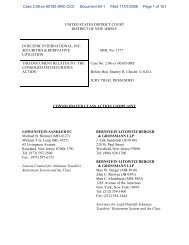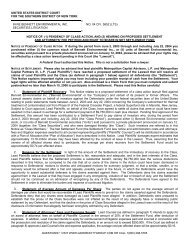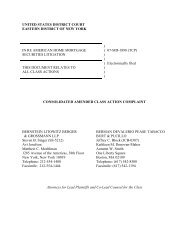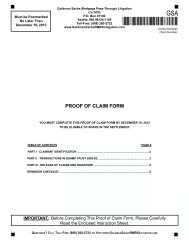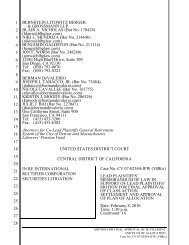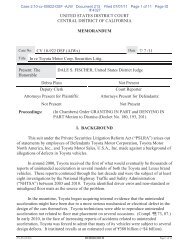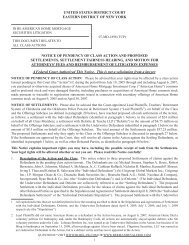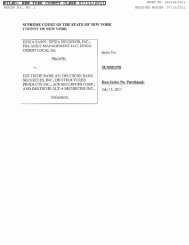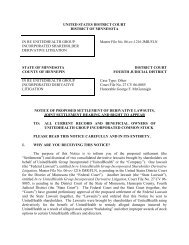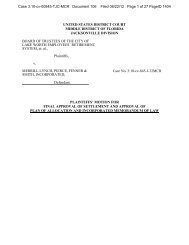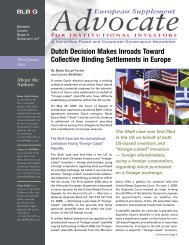to view the Lawdragon's - Bernstein Litowitz Berger & Grossmann LLP
to view the Lawdragon's - Bernstein Litowitz Berger & Grossmann LLP
to view the Lawdragon's - Bernstein Litowitz Berger & Grossmann LLP
Create successful ePaper yourself
Turn your PDF publications into a flip-book with our unique Google optimized e-Paper software.
500Lawdragon Q & A with:ed mossAlthough Ed Moss admits he misses representingplaintiffs (he was good at it), a whole slew ofcorporations are happy he made <strong>the</strong> switch <strong>to</strong> defensesidework permanent. He stands as a titan in <strong>the</strong> areaof products liability and o<strong>the</strong>r complex commercialcases nationally, and is easily one of <strong>the</strong> most admiredlitiga<strong>to</strong>rs in <strong>the</strong> state of Florida, where he has practicedhis entire career.The Shook Hardy & Bacon partner has emerged as apopular figure while representing some pretty unpopularclients. Perhaps most famously, Moss has defendedBrown & Williamson in major <strong>to</strong>bacco litigation, including<strong>the</strong> class action brought by flight attendants oversecond-hand smoke, which went through months oftrial before ending in a landmark settlement. O<strong>the</strong>r clientshave included Texaco, Hartford Insurance, Boeing,Westinghouse, Home Depot and American HomeProducts, among many o<strong>the</strong>rs.LAWDRAGon: You did well with plaintiffs’-side work.How did you come <strong>to</strong> move <strong>to</strong> defending cases?ED MOSS: We were quite successful [at <strong>the</strong> plaintiffs’firm], we had a very vigorous practice with some veryimpressive results. When I decided <strong>to</strong> leave and startwhat became Anderson & Moss, our goal was <strong>to</strong> fill aniche. We knew that, at that time, <strong>the</strong>re were not anabundance of lawyers in South Florida who had realtrial experience and who really tried complex commercialcases. Senior partners at large firms were responsiblefor those types of cases and clients, and Miami-Dade County was not heavy on that type of trial lawyer.We thought that this could be a void we could fill, andit worked. Anderson & Moss began with a fair numberof plaintiffs’ cases and it continued that way for awhile, but <strong>the</strong> plaintiffs’ cases kind of dropped off.More and more clients called on us <strong>to</strong> defend casesand o<strong>the</strong>r personal injury and complex commercialmatters. By <strong>the</strong> time we merged in<strong>to</strong> Shook Hardy, weweren’t doing any plaintiffs’ work <strong>to</strong> speak of.LD: Do you miss <strong>the</strong> plaintiffs’ practice?EM: To this day, <strong>the</strong>re are some things about plaintiffs’work that, if you’ve done it and done it reasonably well,<strong>the</strong>re has <strong>to</strong> be something wrong with you if you don’tmiss it. A lot of <strong>the</strong> practice involves getting good resultsor verdicts for some very nice people – that part of it,sure, I miss. But I’ve become known as a defense lawyer,and <strong>the</strong>re’s nothing wrong with that. I enjoy what I do.LD: What’s different about trial work now? What haveyou noticed changing over <strong>the</strong> years?By john rYanEM: Jurors are much better informed than when Ibegan. The amount of publicly available informationand <strong>the</strong> manner and means by which people arebecoming informed are much different. When you walkin<strong>to</strong> a courtroom and represent a chemical or oil company,or a <strong>to</strong>bacco company, jurors unquestionablyarrive with some pretty strong opinions. Hopefullythose opinions are not fixed, but sometimes <strong>the</strong>y are.Over time that’s become a much more difficult situation.You must deal with it upfront, in voir dire. Youcan’t go in <strong>the</strong>re with your head in <strong>the</strong> sand; you have<strong>to</strong> face it head on. Except for some pure commercialcases, most of <strong>the</strong> cases that I now handle involveserious claims of personal injury, or are class actionsor mass <strong>to</strong>rts.LD: What is a key ingredient <strong>to</strong> defending clients thatmay be unpopular, when <strong>the</strong> plaintiffs’ experience willalmost surely be grounds for some sympathy?EM: Well, first of all, you need <strong>the</strong> ability <strong>to</strong> talk andreason with people. With jurors, your task as a lawyeris for <strong>the</strong>m <strong>to</strong> at least be impressed that you are someonewho will give us a straight s<strong>to</strong>ry. You’re talkingabout a feeling of trust. That is an essential elementthat some lawyers can engender, and o<strong>the</strong>rs do not. Ifyou can’t command that type of reaction from jurors,<strong>the</strong>n this is not <strong>the</strong> profession you ought <strong>to</strong> be in; atleast, you shouldn’t be trying cases.LD: What do you think is <strong>the</strong> <strong>to</strong>ughest or most challengingcase of your career?EM: My very <strong>to</strong>ughest case I can’t talk about, because<strong>the</strong> client would not appreciate it. But ano<strong>the</strong>r memorableone was years ago, when I was hired <strong>to</strong> becomeone of <strong>the</strong> lead counsel in defending <strong>the</strong> 1986 SanJuan Dupont Plaza fire. There were 108 deaths andhundreds of horrible injuries. The case was tried infederal court in San Juan, Puer<strong>to</strong> Rico. The trial wen<strong>to</strong>n pretty much for a year and was interrupted by ahuge hurricane – Hugo. For those of us who stayed<strong>the</strong> course in San Juan, <strong>the</strong> amazing thing was that<strong>the</strong> jurors never missed a day. When <strong>the</strong>y were supposed<strong>to</strong> come back after <strong>the</strong> hurricane, <strong>the</strong>y cameback. That is a monumental case in my memory,spending two-and-a-half years in San Juan – a yearand a half in San Juan preparing and ano<strong>the</strong>r year trying<strong>the</strong> case. To say that <strong>the</strong> hotel was grossly underinsureddoesn’t capture it – it had only a million dollarsin coverage.See <strong>the</strong> full Q&A at www.lawdragon.com/lawyer-limelights/ed-moss.L A W D R A G O N 120 I s s u e 13 Pho<strong>to</strong> by: Josh Ritchie



